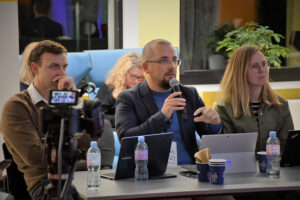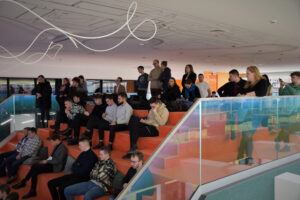The winners of the digital twins hackathon DIGITWIN organised by the KTU Faculty of Civil Engineering and Architecture (FCEA), which started on 4 November, have been revealed. Of the 14 teams that participated and presented their ideas in the first phase, 11 teams continued to develop their prototypes, and presented them to the jury on 2 December. Ideas ranged from navigation inside buildings, occupancy monitoring of laboratories, to real-time tracking of tilting of structures and even urban air pollution warning systems. A prize fund of €4,500 was distributed to participants for the best ideas and prototypes in both rounds.

“This was the first hackathon in Lithuania dedicated specifically to the topic of built environment digital twins and we consider it a real success. Not only did we have a large number of participants, but we also had a wide range of professionals from construction, IT, investment funds and other businesses who came to advise and mentor our young innovators. The participants’ ideas and their execution impressed members of the jury, and we hope that the teams will not stop here, and perhaps some of them will establish their own start-ups,” said Prof. Andrius Jurelionis, Dean of the KTU FCEA, after the event.
Students and researchers, professionals working in the fields of civil engineering, information technology, architecture, automation, energy and environmental engineering were invited to take part in the hackathon. However, the majority of the participants were students of civil engineering and information technologies. Participants worked in teams of 3-6 members.
In the first stage, 5 teams were awarded the best ideas, and the jury selected the top 3 during the final event.
The main prize went to the team that developed a prototype system that would indicate in which rooms people are trapped or hiding during fire, with this data transmitted to firefighters by the dispatchers of the Fire and Rescue Service. According to the team, the biggest challenge was to find the appropriate sensors that could work in high temperatures.
Second place was awarded to the team developing a navigation app to help people find their way around buildings, find the right ward in a hospital or the right terminal at an airport. The biggest challenge for this team was the lack of a GPS signal indoors, which meant finding ways to ensure location recognition.
Third place went to the team that devised and linked different sensors to detect the tilt and shift of building structures and mapped this data in a digital twin model. The team believes that such an application has high market potential in the infrastructure and complex building maintenance sector.

“The jury wished we could award more participants because the ideas were great, and the teams could have been encouraged to develop them further. I think many engineers underestimate the opportunity to contribute to innovation as they prepare for their careers. We wanted to show that university graduates with good ideas can set up their own start-ups, they can get support from the university and various foundations, and their careers can take a very interesting turn,” said Andrius Jurelionis, adding that the participants also had the opportunity to meet various business partners and to hear inspiring presentations on the digitalisation of the construction sector.
Zeljko Djuretic, Head of Academic Programmes at Bentley Systems, who travelled from the Netherlands for the event, shared his knowledge with the participants during the first phase. Sandip Jadhav, the co-founder of CCTech in India, interacted with the participants remotely and shared his experience of working with digital twin technologies. Firstpick’s Marijus Andrijauskas shared the subtleties of short presentations of start-up ideas with the participants. During the final event, Greg Demchak from Bentley Systems gave a presentation on industry-changing innovations.
Participants were advised by representatives of INHUS, Staticus, Bentley Systems, KTU Centre for Smart Cities and Infrastructure, KTU Virtual and Augmented Reality Technology Laboratory and KTU Startup Space.
Video from event: https://youtu.be/VB5PwKT1e8Q